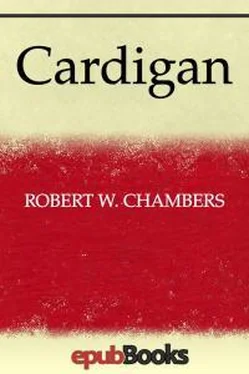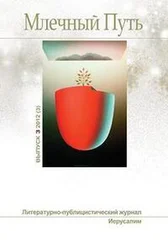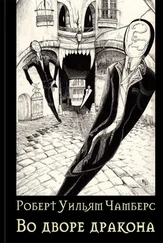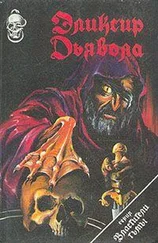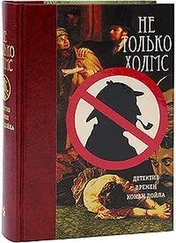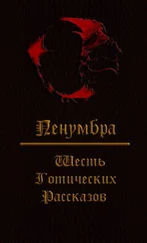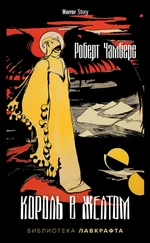Роберт Чамберс - Cardigan
Здесь есть возможность читать онлайн «Роберт Чамберс - Cardigan» весь текст электронной книги совершенно бесплатно (целиком полную версию без сокращений). В некоторых случаях можно слушать аудио, скачать через торрент в формате fb2 и присутствует краткое содержание. Год выпуска: 2014, Издательство: epubBooks Classics, Жанр: Историческая проза, на английском языке. Описание произведения, (предисловие) а так же отзывы посетителей доступны на портале библиотеки ЛибКат.
- Название:Cardigan
- Автор:
- Издательство:epubBooks Classics
- Жанр:
- Год:2014
- ISBN:нет данных
- Рейтинг книги:3 / 5. Голосов: 1
-
Избранное:Добавить в избранное
- Отзывы:
-
Ваша оценка:
- 60
- 1
- 2
- 3
- 4
- 5
Cardigan: краткое содержание, описание и аннотация
Предлагаем к чтению аннотацию, описание, краткое содержание или предисловие (зависит от того, что написал сам автор книги «Cardigan»). Если вы не нашли необходимую информацию о книге — напишите в комментариях, мы постараемся отыскать её.
Cardigan — читать онлайн бесплатно полную книгу (весь текст) целиком
Ниже представлен текст книги, разбитый по страницам. Система сохранения места последней прочитанной страницы, позволяет с удобством читать онлайн бесплатно книгу «Cardigan», без необходимости каждый раз заново искать на чём Вы остановились. Поставьте закладку, и сможете в любой момент перейти на страницу, на которой закончили чтение.
Интервал:
Закладка:
It hurt me a little that she had not recognized in me many of the traits I had painted for her so carefully, and presently I disclosed myself as the mysterious original of the portrait.
"You!" she exclaimed, in amazement. Then, not to hurt me, she said it was quite true that I did resemble her ideal, and only lacked years and titles and wealth and reputation to make me desirable for her.
"I believe, also," she said, "that Aunt Molly means that we marry. Betty says so, and she is wiser than a black cat."
"Well," said I, "we can't marry, can we, Silver Heels?"
"Why, no," she said, simply; "there's all those things you lack."
"And all those things which you lack," said I, sharply. "Now, Marie Livingston—"
"She is older than I!" cried Silver Heels.
"And those things I lack come with years!" I retorted.
"That is true," she answered; "you are suitable for me excepting your years, which includes all you ought to be."
"Suppose you wait for me?" I proposed. "If I wed not Marie Livingston, I will wed you, Silver Heels."
I meant to be generous, but she grew very angry and vowed she would rather wed young Bareshanks than me.
"I don't care a fig," said I; "I only meant you to be suitably wed one day, and was even willing to do so myself to save you from Captain Butler. Anyway I'll kill him next year, so I don't care whether you marry me or not."
"A sorry match, pardieu!" she snapped, and fell a–laughing. "Michael, I will warn you now that I mean to wed a gentleman of rank and wealth, and wear jewels which will blind you! And I shall wed a gallant gentleman of years, Michael, and scarred with battles—not so to disfigure a pleasing countenance, but under his clothes where none can see—and I shall be 'my lady!'—mark me! Michael, and shall be well patched and powdered as befits my rank! I shall strive to be very kind to you, Michael."
Her cheeks were aflame, her eyes daring and bright. She picked up her skirt and mocked me in a curtsey, then marched off, nose in the wind, to join Sir William and Mr. Duncan, who were returning along the bank with a few brace of fish.
The sun had dropped low behind the trees ere we were prepared to depart. Bareshanks brought around my horse, and I mounted without difficulty this time.
As the wagon moved off Mr. Duncan started a hymn of Watts, which all joined, the soldiers and young Bareshanks also singing lustily, it being permitted for servants to aid in holy song.
So among the woods and out into the still country, with the sun a red ball sinking through saffron mist and the new moon aslant and dim overhead.
As I rode, the whippoorwill called after me from the darkening woods; the crickets began from every tuft, and far away I heard the solitary hermit at vespers in the still pines.
It was night ere the lights of Johnstown glimmered out against the hill–side where, on the hillock called Mount Johnson, the candles in our windows spun little rings of fire in the evening haze.
As we passed through the village, the good people turned to smile and to doff their hats to Sir William, thinking not less of him for riding with his flock in the straw–lined wagon, and on they went; I pulling rein at the blacksmith's, as Warlock had cast a shoe on the stony way below.
While the smith was at his forge I dismounted and stood in the fire–glow, stroking Warlock's velvet nose, and watching the fiery flakes falling from the beaten metal.
And as I stood, musing now on Silver Heels, now on Mr. Butler, came one a–swaggering by the shop, and bawling loudly a most foolish lilt:
"Diddle diddle dumpling,
My son John
Went to bed with one shoe on;
One shoe off and one shoe on;
Diddle diddle dumpling,
My son John!"
Perceiving me in full uniform the songster halted and saluted so cheerfully that I rendered his salute with a smile. He was drunk but polite; a great fellow, six feet two at least, all buckskin and swagger and raccoon cap, with tail bobbing to his neck, a true coureur–de–bois, which is the term for those roaming free–rifles whose business and conduct will not always bear investigation, and who live by their wits as well as by their rifles.
"A fine horse, captain," quoth he, with good–natured, drunken freedom, which is not possible for gentlemen to either ignore or resent. "A fine horse, sir, and, by your leave, worthy of his master!" And he stood swaying there heel and toe, with such a jolly laugh that I laughed too, and asked the news from Canada.
"Canada!" he roared, in his voice of a giant. "I've not sniffed priest or Jesuit these six months! Do you take me for a Frenchy, captain?"
At that moment another man who had been pushing his nose against the window of a bake–shop crossed the street and joined the giant in buckskin, saluting me carelessly as he came up.
He was short and meagre and weasel–eyed, sharp–muzzled, and dingy as a summer fox. He was also drunk, yet his mouth was honest, and I judge not from such things, nor yet by the eye, but by men's lips and how they rest one upon the other, and how they laugh.
Waiting there for my horse, I paced up and down the doorway, sometimes glancing at the motley pair in their fringed buckskins, who were fondly embracing one another, sometimes watching the towns–people, passing before the lighted windows. There were soldiers strolling, two by two, lingering at bake–shops to sniff the ovens; there were traders, come to town to solicit permits from Sir William for the Canadas. At times the tall, blanketed form of a Mohawk passed like a spectre with the red forge light running along his rifle barrel, followed by his squaw, loaded with bags of flour, or a haunch of salted beef, or a bale of pelts crackling on her back.
My pair of buckskin birds, loitering before the tavern, had been observed and mistaken for French trappers by half a dozen soldiers of the Royal Americans, who were squatting in a row on the tavern porch, and a volley of chaff was fired at short range.
"Mossoo! Oh, Mossoo! I say, Mossoo! How's Mrs. Parleyvoo and the little Parleyvoos? What's the price of cat–stew in Canada? Take that cat–tail off your cap, Mossoo!"
The big ranger gave them a drunken stare, then burst into a laugh.
"Why, it's some of those lobster–backs. Hello! Old red–bellies! They're going to give another tea–party in Boston, I hear. Didn't they invite you?"
"Come across the street and we'll give you a tea–party, you damned Yankee!" cried the soldiers, unbuckling their leather belts and swinging them.
"Come over here and we'll drum the rogue's march on you!" shouted the little ranger, planting his legs wide apart and drawing the ramrod from his long rifle.
A watchman with rattle, pike, and lanthorn came hobbling up, threatening to sound his call. A group of towns–people gathered behind him, protesting against the disturbance.
But the two rangers flourished their ramrods and taunted the soldiers with inquiries which I did not understand at the time, such as: "How's Bully Tryon and his blood–pudding?" "I learn that Tommy Gage has the gout; too much Port–Bill; he needs bleeding, does Tommy Gage!"
Then the big ranger, addressing soldiers, watchman, and towns–people as "bloody–backs," "cow–rumps," and "scratch–wigs," advised them all to pickle their heads and sell them in Albany, where cabbage was much esteemed among the Dutchmen.
"Come up to the barracks and we'll show you what pickling is," shouted the soldiers, wrathfully.
"Come out in the woods and I'll show you something to beat pickled pig!" replied the little ranger, cheerfully.
Behind me I heard the trample of hoofs; the smith was backing Warlock out into the street. I paid him; he held my stirrup, and I mounted, walking my horse out between the soldiers, the people, and the two rangers.
Читать дальшеИнтервал:
Закладка:
Похожие книги на «Cardigan»
Представляем Вашему вниманию похожие книги на «Cardigan» списком для выбора. Мы отобрали схожую по названию и смыслу литературу в надежде предоставить читателям больше вариантов отыскать новые, интересные, ещё непрочитанные произведения.
Обсуждение, отзывы о книге «Cardigan» и просто собственные мнения читателей. Оставьте ваши комментарии, напишите, что Вы думаете о произведении, его смысле или главных героях. Укажите что конкретно понравилось, а что нет, и почему Вы так считаете.
